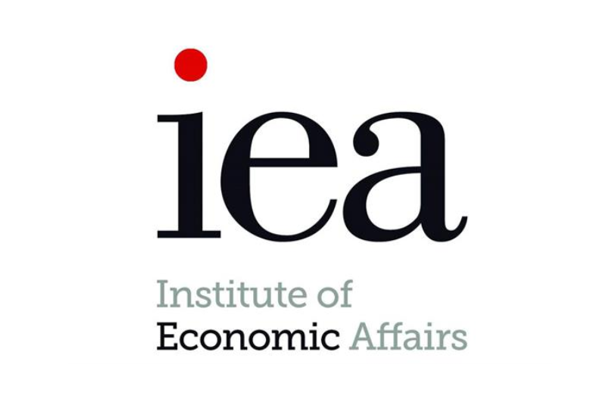Julian Morris
Credentials
- Graduate Diploma, Law, University of Westminster (1999).1“Julian Morris,” Profile at the International Policy Network (policynetwork.net). Archived December 11, 2004.
- MPhil, Land Economics, Cambridge University (1995).2“Julian Morris,” Profile at the International Policy Network (policynetwork.net). Archived December 11, 2004.
- MSc, Environment and Resource Economics, University College London (1993).3“Julian Morris,” Profile at the International Policy Network (policynetwork.net). Archived December 11, 2004.
- MA, Economics, Edinburgh University (1992).4“Julian Morris,” Profile at the International Policy Network (policynetwork.net). Archived December 11, 2004.
Background
Morris is the president, founder (in the 2001 rebranding), and past Executive Director of the International Policy Network (IPN), a UK-based free market think-tank. He is also the vice president of Research at the Reason Foundation,5“Reason Foundation Staff: Julian Morris,” The Reason Foundation. Accessed January, 2012. and has previously worked with the Institute of Economic Affairs (IEA) in London.6“Julian Morris,” profile at the International Policy Network. Archived July 10, 2012. 7“People: IPN’s Staff,” The International Policy Network. Archived March 13, 2007.
According to their website, the IPN is a charity based in the UK, and a non-profit (501c3) organization in the US. The North American arm of the IPN has received $390,000 from ExxonMobil.
According to UK Charity Commission filings (PDF), the IPN works under the umbrella of the Atlas Research Foundation (UK).8“Atlas Economic Research Foundation (UK) working as The International Policy Network UK: Report and Financial Statements” (PDF), July 24, 2008, Retrieved January, 2012, from charitycommission.gov.uk (Charity no: 262982).
An archive of IPN’s website in 2001 shows that IPN “was formerly called The Atlas Economic Research Foundation UK, a charity established by Trust Deed in 1971.” The Atlas Foundation was originally founded by Sir Antony Fisher, who also founded the Institute of Economic Affairs (IEI), and assisted in creating the Manhattan Institute, the Pacific Research Institute (PRI) and the Fraser Institute.9“About IPN,” International Policy Network. Archived December 12, 2001. 10“Founder’s Story,” Atlas Network. Accessed January, 2012.
Atlas has also received funding from ExxonMobil, including at least $1,082,500 since 1998.
Stance on Climate Change
“The science of climate change is far from settled. Arguably, it will never be settled. If climate is indeed a chaotic system, as it seems to be, then it is unlikely that we will ever be able perfectly to describe all the relationships between different variables in the system.”11Julian Morris. “Which Policy to Address Climate Change?” (PDF), Archived June 3, 2013
Key Quotes
“[U]niversal adoption of the institutions of the free society would better enable adaptation to climate both now and in the future. It would also ensure that, if at some point in the future, a real catastrophe, whether human-induced or otherwise (including climate change), does loom on the horizon, humanity would be in a better position to address it.”12Julian Morris. “The Role of Market Institutions in Enabling Adaptation to Climate Change,” Reason Foundation, September 7, 2006.
Key Deeds
March 8, 2018
Morriss wrote a study for the Reason Foundation titled “Climate Change, Catastrophe, Regulation and the Social Cost of Carbon” where he argued that “The effects of climate change are unknown—but the benefits may well be greater than the costs for the foreseeable future” and that “mandatory emissions reductions are not justified and the social cost of carbon (SCC) to be applied by regulatory agencies should be $0.” View full study here.13“Climate Change, Catastrophe, Regulation and the Social Cost of Carbon,” Reason Foundation, March 8, 2018. Archive.is URL: https://archive.is/Xmhue 14“CLIMATE CHANGE, CATASTROPHE, REGULATION AND THE SOCIAL COST OF CARBON” (PDF), Reason Foundation, March 2018.
May 21–23, 2012
Julian Morris was a speaker at the Heartland Institute‘s 7th International Conference on Climate Change (ICCC7).15 “Seventh International Conference on Climate Change, Program,” (PDF) Heartland Institute. January 23, 2018.
His speech, titled “Climate Change and Sustainable Development” can be viewed below.
DeSmog researched the co-sponsors behind Heartland’s ICCC7 and found that they had collectively received over $67 million from ExxonMobil, the Koch Brothers and the conservative Scaife family foundations.
May 2010
Morris was a speaker at the Heartland Institute‘s fourth International Conference on Climate Change. (ICCC4.)16“4th International Conference on Climate Change” (PDF), The Heartland Institute. Retreived January, 2012, from the University of Hartford web server (uhaweb.hartford.edu).
His speech, titled “2012: A Fable for Carbon Traders” can be viewed below.
DeSmog has done research on the co-sponsors of the conference and found that 19 of the 65 sponsors (including Heartland itself) have received a total of over $40 million in funding since 1985 from ExxonMobil, Koch Industries family foundations or the Scaife family foundations.
March 2008
Morris was a speaker at the Heartland Institute‘s first International Conference on Climate Change (ICCC1.)17“First International Conference on Climate Change, Program,” (PDF) Heartland Institute. Archived February 21, 2018.
His speech, titled “The Role of Markets in Adapting to Climate Change” can be viewed below.
December 2006
Morris Contributed to Section II (Economics) of the Stern Review: a Duel Critique (PDF). Other authors of “The Stern Review: A Dual Critique” include the high profile climate skeptics Richard Lindzen, Ross McKitrick, Chris de Freitas and Bob Carter.18“The Stern Review: A Dual Critique” (PDF), World Economics, Vol. 7, No. 4 (October – December, 2006).
The original Stern Review, a report commissioned by the British government, supported supported the findings of the Intergovernmental Panel on Climate Change (IPCC) and advocated immediate action to mitigate the serious global threat climate change poses.
September 2000
Morris wrote an article for the Heartland Institute titled “Ten tips to help our planet … revisited.” The article first denounces recycling, announcing that “we don’t need to recycle everything. We aren’t running out of room for our trash.”19“Ten tips to help our planet…revisited,” The Heartlander, September 1, 2000.
The article makes other points:
- “Energy supplies [especially coal] in the U.S. and globally are abundant and growing more plentiful over time” so there is no need to conserve energy.
- Chemical pesticides and herbicides are safer than natural ones.
- Ivory and fur trade should be encouraged internationally because if ivory could be readily sold “villagers would be even more protective of the elephants.”
- Private property “is not incompatible with environmental protection: in fact, it is the best guarantor.”
- “Buses and trains are less energy-efficient per passenger mile than cars and trucks.”
- National parks should be effectively privatized: “Realistic fees, with the revenues staying in the place where they are collected, should be the main financial support for our national parks.”
- Don’t support Environmental Defence because they will waste your money.
Morris also provides advice on how to stay informed on global warming:
“Don’t rely on newsletters and fundraising letters from environmental groups to tell you what problems are real and need attention. Check out the materials produced by The Heartland Institute, PERC, Pacific Research Institute, Cato, and other organizations devoted to sound science, rational economics, and free market environmentalism.”
And, further on this point: “young children should have a chance to experience and enjoy the wonders of nature without being force-fed a diet of anti-business and anti-technology half-truths,” so should also learn from these “organizations devoted to sound science.”
The Heartland Institute is known for its continuous opposition to mainstream global warming science, and hosts its annual event to draw media attention to climate change skepticism. They have received signification funding from the oil and tobacco industries as well as from numerous right-wing foundations.
Affiliations
- The International Policy Network (IPN) — President, Founder (Listed as such after 2001 rebranding; original founder appears to have been Antony Fisher in 1971), and past Executive Director.
- The Heartland Institute — “Expert.”20“Heartland Experts: Julian Morris,” The Heartland Institute. Accessed January, 2012.
- Institute of Economic Affairs (IEA) — “Honorary Fellow.” 21“Fellows and advisors,” Institute of Economic Affairs. Accessed January, 2012. and past member, Academic Advisory Council22“About the IEA: Personnel,” Institute of Economic Affairs. Archived March 9, 2005.. Also served as past director of IEA’s “environment and technology” program.23“About the IEA: Personnel,” Institute of Economic Affairs. Archived February 20, 2003.
- International Climate Science Coalition (ICSC) — Member, Policy Advisory Board.24“WHO WE ARE,” International Climate Science Coalition. Accessed January, 2012.
- Electronic Journal of Sustainable Development — Co-Editor.25“Editors,” Electronic Journal of Sustainable Development. Accessed January, 2012.
Social Media
- @Julian_Morris on Twitter
Publications
Morris co-authored Global Warming: Apocalypse or Hot Air? (1994) for the Institute of Economic Affairs.
Morris’s books include Sustainable Development: Promoting Progress or Perpetuating Poverty (Profile Books, 2002) and Rethinking Risk and the Precautionary Principle (Butterworth-Heinemann, 1999).
He is also the co-editor (with fellow skeptic Indur Goklany) of the Electronic Journal of Sustainable Development (EJSD).26“Editors,” Electronic Journal of Sustainable Development. Accessed January, 2012.
Other Resources
- “Julian Morris,” SourceWatch profile.
- “Julian Morris,” Wikipedia entry.
- ExxonSecrets Factsheet: Julian Morris.
- “Julian Morris,” PowerBase Profile.
Resources
- 1“Julian Morris,” Profile at the International Policy Network (policynetwork.net). Archived December 11, 2004.
- 2“Julian Morris,” Profile at the International Policy Network (policynetwork.net). Archived December 11, 2004.
- 3“Julian Morris,” Profile at the International Policy Network (policynetwork.net). Archived December 11, 2004.
- 4“Julian Morris,” Profile at the International Policy Network (policynetwork.net). Archived December 11, 2004.
- 5“Reason Foundation Staff: Julian Morris,” The Reason Foundation. Accessed January, 2012.
- 6“Julian Morris,” profile at the International Policy Network. Archived July 10, 2012.
- 7“People: IPN’s Staff,” The International Policy Network. Archived March 13, 2007.
- 8“Atlas Economic Research Foundation (UK) working as The International Policy Network UK: Report and Financial Statements” (PDF), July 24, 2008, Retrieved January, 2012, from charitycommission.gov.uk (Charity no: 262982).
- 9“About IPN,” International Policy Network. Archived December 12, 2001.
- 10“Founder’s Story,” Atlas Network. Accessed January, 2012.
- 11Julian Morris. “Which Policy to Address Climate Change?” (PDF), Archived June 3, 2013
- 12Julian Morris. “The Role of Market Institutions in Enabling Adaptation to Climate Change,” Reason Foundation, September 7, 2006.
- 13“Climate Change, Catastrophe, Regulation and the Social Cost of Carbon,” Reason Foundation, March 8, 2018. Archive.is URL: https://archive.is/Xmhue
- 14“CLIMATE CHANGE, CATASTROPHE, REGULATION AND THE SOCIAL COST OF CARBON” (PDF), Reason Foundation, March 2018.
- 15“Seventh International Conference on Climate Change, Program,” (PDF) Heartland Institute. January 23, 2018.
- 16“4th International Conference on Climate Change” (PDF), The Heartland Institute. Retreived January, 2012, from the University of Hartford web server (uhaweb.hartford.edu).
- 17“First International Conference on Climate Change, Program,” (PDF) Heartland Institute. Archived February 21, 2018.
- 18“The Stern Review: A Dual Critique” (PDF), World Economics, Vol. 7, No. 4 (October – December, 2006).
- 19“Ten tips to help our planet…revisited,” The Heartlander, September 1, 2000.
- 20“Heartland Experts: Julian Morris,” The Heartland Institute. Accessed January, 2012.
- 21“Fellows and advisors,” Institute of Economic Affairs. Accessed January, 2012.
- 22“About the IEA: Personnel,” Institute of Economic Affairs. Archived March 9, 2005.
- 23“About the IEA: Personnel,” Institute of Economic Affairs. Archived February 20, 2003.
- 24“WHO WE ARE,” International Climate Science Coalition. Accessed January, 2012.
- 25“Editors,” Electronic Journal of Sustainable Development. Accessed January, 2012.
- 26“Editors,” Electronic Journal of Sustainable Development. Accessed January, 2012.






